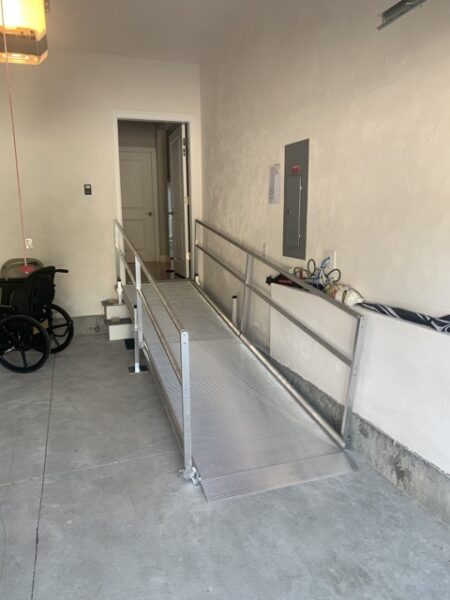
If you or a loved one depends on a wheelchair or other mobility aid to get around, an aluminum ramp is a necessity in your home. For those with mobility challenges, these ramps play a pivotal role in ensuring access to their homes and public spaces. There are many types of ramps available to suit a variety of mobility challenges, and it can be overwhelming to decide what ramp is the best fit for your needs. In this article, we explore the different types of aluminum ramps, their benefits, and features to help you make an informed decision.
What is an Aluminum Ramp?
An aluminum ramp, or access ramp, is an inclined pathway that allows individuals using wheelchairs, scooters, walkers, or any other mobility aide to access buildings or vehicles. They can also be used by anyone who needs assistance navigating elevation changes. These ramps can be permanent, semi-permanent, or portable.
Disability accessible ramps can come in a variety of materials, but aluminum is the standout option for a durable, low-maintenance, cost-effective solution. Aluminum naturally resists rust and corrosion, so it can withstand harsh weather conditions and doesn’t require a lot of maintenance.
The Various Types of Aluminum Ramps Available
There are various types of disability accessible ramps to accommodate different needs, mobility levels, and environments. Below we cover the different types of ramps and explore their features, advantages, and use cases.
Portable Ramps
Portable ramps are lightweight and typically made of aluminum. They come in various sizes and can be moved from place to place with ease. These ramps are useful for temporary or occasional use but can also be used long-term. The following are the different types of portable ramps:
- Threshold Ramps – Also known as saddle ramps and transition ramps, these are wedge-shaped aluminum or rubber ramps that bridge small gaps, such as door thresholds, and are typically between half an inch to six inches in height.
- Folding Ramps – Folding aluminum ramps consist of either two panels (bi-fold) or four panels (tri-fold) and hinges between each panel. These ramps are designed for easy moving and storage and are commonly used where frequent transport is required, such as access into a wheelchair-accessible vehicle.
- Suitcase Ramps – Like bi-fold and tri-fold ramps, a suitcase-style ramp is lightweight and foldable, but it also has handles so that it can be carried like a suitcase for easy transport.
- Telescoping Ramps – This type of wheelchair ramp is made of two narrow, separate channels that can extend different lengths in order to fit the desired height. They can also be retracted for storage. As with all portable ramps, telescoping ramps are lightweight and easy to transport.
Semi-Permanent Ramps
Modular ramps are larger and more permanent fixtures than portable ramps. This type of aluminum disability ramp is made out of interchangeable sections that can be customized to fit your home. They are built off-site before being assembled at your house. These ramps with railings can be taken down after initial assembly and moved to another location if necessary.
Permanent Ramps
Permanent ramps are wooden ramps or concrete ramps that cannot be moved or adjusted once assembled. Ramp installation occurs onsite and begins with a detailed assessment of the site and user needs. While wooden ramps provide an aesthetically pleasing and functional design, these ramps require more maintenance and care than aluminum wheelchair ramps.

Key Features of Aluminum Ramps
Aluminum ramps come with various features designed to enhance the safety and usability of individuals with disabilities. This section covers some key features to look for.
- Durability – Since they’re made of aluminum, these ramps are long-lasting and resistant to harsh weather conditions.
- Portability – Aluminum ramps are lightweight, making them easy to handle and transport.
- Non-Slip Surface – Good access ramps have non-slip surfaces to ensure traction and prevent slips.
- Folding Options – Ramps that fold make them compact and easier to handle or store when not in use.
Benefits of Installing Aluminum Ramps
Aluminum ramps offer the most variety and versatility. The following are some of the key benefits of having an aluminum ramp for use in your home:
- Enhanced Mobility – Wheelchair ramps facilitate movement for users of mobility aids and individuals with mobility issues.
- Increased Safety – Aluminum ramps significantly reduce the risk of falls and injuries, especially when they have an attached non-slip surface. Ramps with railings offer an additional layer of safety.
- Independence – Having a ramp at home enables users to navigate various environments more freely all while staying in the comfort of their homes.
- Versatility – Aluminum ramps can be made to fit into any entrance so that users will have access to wherever they need to go within your home. Plus, they’re suitable for both residential and commercial use.
Financial Considerations
The cost to install a disability accessible ramp can vary greatly depending on the type of ramp, the material it’s made out of, and the configuration of where the ramp will be installed. Portable aluminum ramps can range from $100 to $1,000. Modular ramps, which can be customized for specific spaces, typically start at around $1,000 and increase based on length and any additional features, such as handrails or non-slip surfaces. Custom ramps can cost close to $8,000. Commercial ramps are more expensive than residential ramps and range between $5,000 and $20,000.
If you’re looking for a short-term, temporary solution, then renting a wheelchair ramp is the more cost-effective way to go. The cost of the monthly rental depends on the type of ramp, but smaller, portable ramps will cost less than larger, modular ramps. Some rental companies may require a refundable deposit and charge fees for delivery, setup, and pickup. Be sure to inquire about these costs upfront.

Expert Tips for Choosing an Aluminum Ramp
With so many different types of aluminum ramps out there, it’s important to properly research the available options. Before buying one, here are a few things to consider:
- Assessing Needs – Consider the user’s weight and mobility challenges. Different ramps, such as bariatric ramps, are available to suit a wide range of disabilities.
- Ramp Specifications – Aluminum ramps come in different sizes, so consider the length and width of the areas where a ramp is necessary.
- Supplier Reputation – Make sure to research the suppliers of the access ramps you are considering. Choose a reliable brand and supplier.
- Customization Options – Some ramps can be customized to suit specific needs and spaces, as well as different weather conditions. In light of this, read our guide to melting snow and ice from your custom ramp.
The Bottom Line
The right aluminum ramp can enhance the accessibility and safety of those with mobility issues. When looking to buy a ramp, be sure to consult healthcare professionals for personalized advice before you make a decision.
And On the Mend Medical Supplies & Equipment is here to help as well. We have a full selection of aluminum ramps, including the popular aluminum SUITCASE ramps, for you to browse and staff on hand to answer any and all questions. Contact us on our website or by phone at (844) 470-6363.
FAQs
What are the main types of aluminum ramps?
Aluminum ramps can be permanent (wooden ramps), semi-permanent (modular ramps), or portable (threshold ramps, folding ramps, suitcase ramps, telescoping ramps).
What features should I look for in an aluminum ramp?
Some features you should look for in an aluminum ramp include durability, portability, non-slip surfaces, and folding options.
How much do they cost?
The cost to install an aluminum ramp can vary depending on the type of ramp and the configuration. These ramps can cost as little as $100 and as much as $10,000 for customized ramps.
What are the benefits of installing an aluminum wheelchair ramp?
Some benefits of installing a ramp include versatility, enhanced mobility, increased safety, and independence.
Where can I get a wheelchair ramp?
Contact On the Mend for all your aluminum wheelchair ramp needs.
